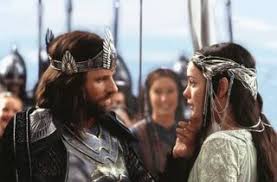
A new entry in the fantasy tradition,
Among the Ruins of the Kingdom, by Douglas Hatten, is fast-paced and engaging. Although it started a bit slow, I was hooked by about page 50 and after about page 150 I could not put the book down. Hatten is the cousin of my friend Maryjane Ferguson, a disclaimer that means little in terms of this review. If I had disliked the book I simply would not have reviewed it...so I'm happy to recommend this book to you. It's a touchy thing to review a book by someone you have a connection to. I admit that my tendency is to sheath my claws a bit. Enjoy!
 |
| The author, Douglas Hatten |
Among the Ruins follows a standard quest format--a teenage boy is selected and identified as the champion of good versus evil. He undergoes numerous trials and contests and gathers allies and magical objects. He gains power and skill as he goes along. This is an entirely predictable formula, repeated again and again in all genres of literature and in uncounted movies and video games. Yet, it works. It still works, even when I know exactly what's going on and even when I am certain of the outcome (the hero prevails). The quest format is a comfortable template upon which to build a story and allows the reader to focus on themes and characters.
 |
I pictured Chayim as a young
Leonard DiCaprio |
In
Among the Ruins, just-turned-17-year-old Chayim is forcibly diverted from his life as a peasant-scholar. His parents were told to send him for schooling because of a prophecy. Among his family and teachers, only Chayim did not know that he had a special destiny. Seventeen is the age of adulthood in Chayim's culture and his adventure starts right on his birthday--a nice touch. On his way home from school, Chayim is stalked by a shadow being and is rescued by a wizened old man who carries a walking stick--the Gandalf character. I don't think Hatten stole the idea of Gandalf from Tolkien--I just think that the wise old teacher is a fixture in quest literature. Tolkien got his Gandalf from a much older tradition.
 |
Here's my favorite cinematic Jesus--Ted Neely
from Jesus Christ: Superstar. What might Jesus
have accomplished with a good mentor like
Gandalf? |
ASIDE: It is peculiar that the ultimate quest/savior, Jesus, did not have a mentor...or his mentor was lost in the retelling. So much of quest literature is based in Christianity...somehow the mentor character survived his/her exclusion from the Christian story. The disciples were clearly subordinate to Jesus, not advisers or teachers. I'm not a Christian scholar...are there versions of the Jesus story that indicate a mentor? In a sense, I guess his dad was his mentor, except maybe without a walking stick. Please comment if you have feedback on this.
 |
Aragorn had a romance--and a hot French
kiss you can see if you watch the scene in
super slow-mo. Lucky couple! |
Anyway, when the mentor, Zidek, rescues Chayim, the adventure begins. Chayim, with the help of various friends and powers, must somehow collect the armor of a great king, which will allow him to prevail in a great battle between good and evil...and bring back the great king (a reference to the second coming of Jesus?) and a time of peace. I will not go into the plot here--don't want to risk any spoilers--but danger, courage, discouragement, betrayal, violence, victory, and love are a part of it. We watch as Chayim grows into his hero role. And, a romance is provided for him, which makes him a tad luckier than Jesus and Frodo!
 |
A thick forest is one of the memorable locations
of Among the Ruins |
Hatten presents a coherent worldview for his fantasy--a set of sacred texts, spiritual practices, initiates and intiators. The history of the kingdom is fully present in the present, which is a nice thing. As a reader, I had a strong sense of Chayim's heritage and traditions. This increased the plausibility of the book. The sensory detail was sparse--a polar opposite from Tolkien--and yet I had a physical sense of place. And certainly after Chapter 1, I was fully engaged in this world and retain it as a place I have visited.
The main philosophical question in Among the Ruins seemed to be the conflict between predestination and free will. The author worked hard to reconcile these two ideas...repeatedly and often. Several times, Chayim questions his role in the drama...does his free will mean anything at all in the face of living out a prophecy that was written millenia ago? The issue is not resolved to my satisfaction, but then I am a free will sort of person. I don't believe that "it is written" until I've written it.
My favorite scenes were those in which Chayim felt the pull of the power of creation. In a Joseph Campbell sense, he was open to allurement and followed its energy. Anyway, when the pull started, I knew something amazing was going to happen--an amazing dragon, a display of superhuman powers, some sort of magic. I loved that. And I loved the idea of ancient portals--short cuts--that would open if Chayim would synchronize with the power.
My main problem with this book is that it could use a good copy edit. I'm pretty fussy about grammar and spelling and usage and such, and maybe I'm just old-fashioned. But one of the reasons I would like a major publisher to pick up and publish this terrific book is that they would give it a serious structural edit and a copy edit. I came across "parameter" used for "perimeter" (twice!), and "its/it's" used improperly, and "suites" used for "suits," and many other bits of carelessness. I think a good editor would also pep up the opening chapters of the book and jump the reader right into the action.
I will be buying book two of this series probably today. Why don't you go and buy book 1? You'll find it for sale at:
http://www.lulu.com/shop/douglas-hatten/among-the-ruins-of-the-kingdom/paperback/product-18837230.html

No comments:
Post a Comment